Does Ralph admit to Jack that he is afraid? In William Golding’s novel Lord of the Flies, whether Ralph admits to Jack that he is afraid is a topic of debate among readers. However, a close examination of the text reveals that Ralph does admit to his fear in a conversation with Jack.
Does Ralph admit to Jack that he is afraid? (Answer)
The scene in question occurs in Chapter 5, when Ralph calls a meeting to discuss the boys’ lack of organization and failure to maintain the signal fire. During the meeting, he makes a rule that the only place where they are going to have a fire is on top of the mountain. This decision is based on the fact that it will be more visible to passing ships and planes, increasing their chances of being rescued.
After this decision, Ralph speaks about their fear. He admits to being afraid but tells them their fears are unjustified. He says, “We’re all frightened. Of course, we’re frightened. But we’re not savages. We’re English, and the English are best at everything.” Here, Ralph acknowledges his fear while reassuring the group that they are still civilized and can overcome their fear.
Jack, however, responds differently. He stands up, takes the conch, and yells at the littluns for screaming like babies and not hunting, building, or helping. He dismisses Ralph’s admission of fear and instead focuses on the need to be strong and assertive.
Why does Jack sneer and ask Ralph if he is frightened? How does Ralph respond?
Jack sneers and asks Ralph if he is frightened because he wants to undermine Ralph’s leadership and assert his own dominance. By attempting to make Ralph appear afraid, Jack aims to diminish his authority and instill doubt in the minds of the other boys. In response, Ralph maintains his composure and confidently asserts that he is not scared, refusing to give Jack the satisfaction of seeing him falter.
What does Ralph’s effort to appease Jack tell you about his character?
Ralph’s effort to appease Jack demonstrates his considerate and mature character. Despite their differences, Ralph recognizes the importance of maintaining harmony and unity within the group. He prioritizes the well-being of everyone on the island by attempting to find common ground with Jack, showcasing his ability to put aside personal disagreements for the greater good.
Why does Ralph become angry with Jack?
Ralph becomes angry with Jack because, as the leader of the hunters, it was Jack’s responsibility to ensure that the fire was maintained on the island. The fire represented their only chance of rescue, and when it went out and a ship passed by without noticing them, Ralph felt a deep sense of betrayal and frustration towards Jack’s failure to fulfill his duty.
What does Ralph complain to Jack about in Chapter 3?
In Chapter 3 of Lord of the Flies, Ralph complains to Jack about the boys’ obsession with hunting and their neglect of important tasks such as building shelters and maintaining the signal fire.
What is revealed when Jack says we don’t need the conch anymore?
When Jack declares they no longer need the conch, it reveals his desire for power and control. By dismissing the importance of the conch, which symbolizes democracy and order, Jack is essentially asserting that he wants to silence those who oppose him or challenge his authority. His statement suggests a shift towards a more authoritarian and dictatorial leadership style, where only his voice matters and dissenting opinions are not tolerated.
Conclusion
In conclusion, Ralph does admit to Jack that he is afraid in “Lord of the Flies.” However, this admission does not lead to a discussion of how to address their fear. Instead, it highlights the different approaches that Ralph and Jack take to leadership and the group’s survival.
